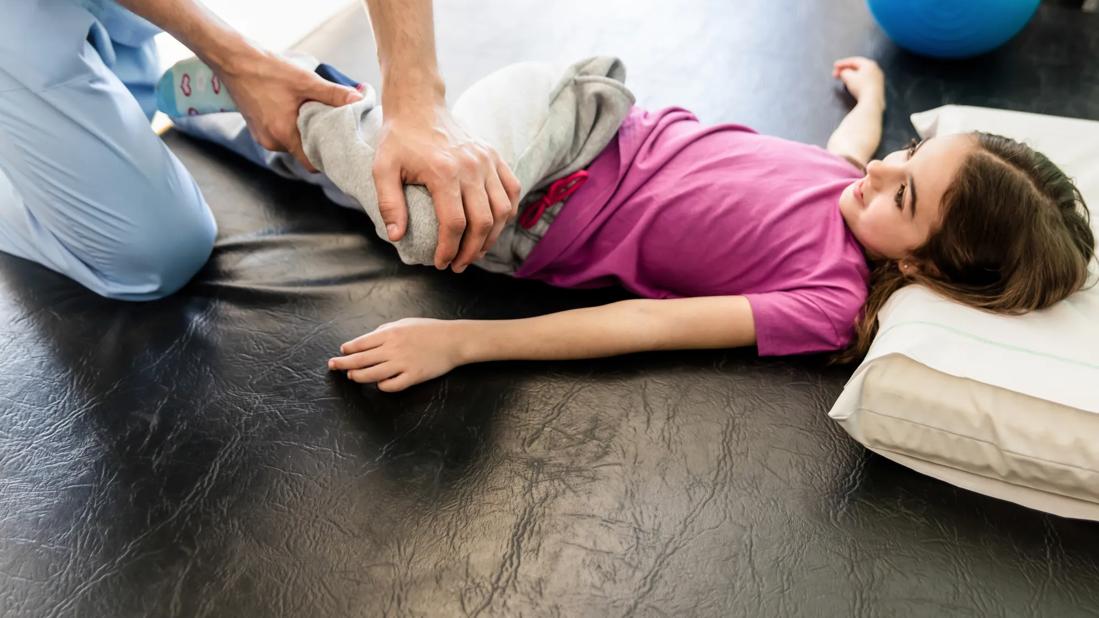CARF reaccredits, citing multiple unique strengths

Cleveland Clinic Children’s Hospital for Rehabilitation’s (CCCHR) offers the only pediatric interdisciplinary pain rehabilitation program in the world accredited by the Commission on the Accreditation of Rehabilitation Facilities (CARF).
Advertisement
Cleveland Clinic is a non-profit academic medical center. Advertising on our site helps support our mission. We do not endorse non-Cleveland Clinic products or services. Policy
In March, when CARF reaccredited the inpatient and outpatient program, the prestigious organization noted 41 unique strengths.
“There are not many programs like ours,” says Gerard Banez, PhD, Program Director of Pediatric Pain Rehabilitation.
CCCHR made the decision to seek CARF accreditation to show a commitment to providing the highest level of services. “It means that we are continuously improving and are committed to patient and family satisfaction,” says Dr. Banez.
In 2015, the program was also recognized by the American Pain Society with its Clinical Centers of Excellence Award, a seal of approval from the pain management world. “It means we were identified as providing outstanding, exemplary pain care,” he says.
Unlike typical programs for pain management, CCCHR offers a three-week treatment program consisting of two weeks of inpatient care, followed by one week of day hospitalization.
The inpatient weeks are an opportunity for the pain management team to care for their patients around the clock, while immersing them in their program’s philosophy. A hospital-based school program ensures the kids don’t fall behind on schoolwork during their stay.
“Our goal is to return the patient to normal functioning, despite their pain,” says Dr. Banez.
Pain is a family problem. It affects not only the child, but the family as a whole. The two inpatient weeks give the kids and their parents a badly needed break from each other. “Our program provides families an opportunity to hit the reset button and get back to a normal life,” says Dr. Banez.
Advertisement
In week three, the patients continue the program during the day, but return home (or to a hotel or the Ronald McDonald House) over the weekend and during the evenings. This allows them to practice the skills they have learned. It also gives the staff a chance to see how well they do and troubleshoot where the kids need additional support.
The pediatric pain team includes an occupational therapist, physical therapists, recreation therapist, psychologists, medical doctors, nurses, social worker and teacher, who work together closely to address the medical, physical, psychological and social aspects of their patients’ pain. Appropriate pain medications may be prescribed if needed, but narcotics are not used.
Most patients who enter the pain rehabilitation program are adolescents, but they have admitted patients as young as age 7. At any given time, 60 to 70 percent of patients come from out of state or abroad.
The most common complaints are complex regional pain syndrome, migraine, chronic daily headache, fibromyalgia, abdominal pain or back pain that has not responded to treatment with traditional methods.
Because the program accepts patients 18 and older who are living a pediatric lifestyle, the program is also CARF-accredited for adult pain rehabilitation.
To qualify for the three-week program, a patient must have chronic pain of a minimum three months’ duration that is interfering with normal functioning, and have attempted and failed standard treatment. “These kids are missing school, aren’t participating in sports or extracurricular activities and aren’t hanging out with friends,” says Dr. Banez.
Advertisement
Short- and long-term outcomes confirm the effectiveness of this unique approach to pain management.
A 2016 outcomes study found that one month after completing the program, the average improvement in physical functioning was 89 percent; social functioning increased 28 percent and anxiety about pain decreased 29 percent.
Five years after finishing the program, the average number of school or work days missed due to pain had dropped from 14 per month to less than one. Scheduled appointments for pain were down significantly, the use of medications had dropped and hospitalizations for pain were rare. That makes for happy kids, relieved parents and satisfied referring physicians.
Advertisement
Advertisement

One pediatric urologist’s quest to improve the status quo

Overcoming barriers to implementing clinical trials

Interim results of RUBY study also indicate improved physical function and quality of life

Innovative hardware and AI algorithms aim to detect cardiovascular decline sooner

The benefits of this emerging surgical technology

Integrated care model reduces length of stay, improves outpatient pain management

A closer look at the impact on procedures and patient outcomes

Experts advise thorough assessment of right ventricle and reinforcement of tricuspid valve